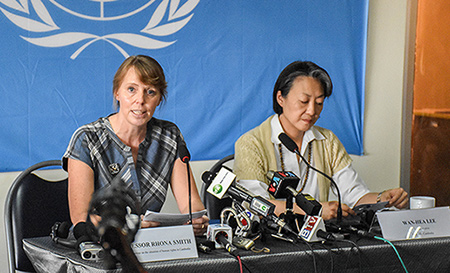UN Special Rapporteur spotlights violence against women in Cambodia and the need for improved response
Date:
[Press Release]
Phnom Penh, Cambodia – The United Nations Special Rapporteur on Human Rights in Cambodia, Rhona Smith, called for a systematic response to end violence against women and highlighted an alarming trend in traditional and social media where violence is reported upon with no respect for human dignity or the rights of the victims.

Speaking to the press at the end of the UN Special Rapporteur’s mission to Cambodia, Ms. Smith underscored the numerous difficulties victims of gender-based violence face in seeking protection and justice. She recommended revising the current Law on the Prevention of Domestic Violence and the Protection of the Victims “to ensure that the response to domestic violence in Cambodia conforms to international standards.”
“Violence against women in itself violates many human rights, including the right to physical integrity, and the right to live free of discrimination,” said UN Women Representative Wenny Kusuma. “We see that victim’s rights are also violated by duty bearer’s failure to respond to gender-based violence, resulting in additional discrimination,” said Ms. Kusuma, adding that Our number one priority must be to ensure that victims of violence have access to protection, justice and health services.
The Royal Government of Cambodia adopted the Second National Action Plan on Violence against Women (2nd NAPVAW), which takes a multi-sectoral approach to ending violence, in December 2014. “It is essential to implement the 2nd NAPVAW on sub-national level through a partnership approach,” said Wenny Kusuma adding that, “UN Women is committed to work in partnership with government and other stakeholders to end violence against women.”
Furthermore, the Special Rapporteur asked members of the press to carefully consider the rights of the victims when reporting on violence against women: “The failure to conform to the most basic ethical standards when reporting on gender‐based violence, and the use of exploitive and degrading imagery perpetuates discriminatory stereotypes and contributes to the desensitization and normalization of violence against women.”
“The media is in a unique position to inform public opinion on violence against women in Cambodia,” said Communications Officer for UN Women, Mariken Harbitz, emphasizing the role of the media in shaping attitudes. “The media’s portrayal of violence in Cambodia is often reported upon in a manner with little or no respect for human rights. It is thus essential to take this practice into account, in order to understand the societal acceptance, justification and continuous perpetration of violence against women,” added Ms. Harbitz who has worked with the media in Cambodia on reporting of violence.
A WHO and UN Women supported study from 2015 shows that 1 in 5 women in Cambodia have experienced physical and/or sexual violence. Almost half (49 per cent) of those women who reported experiencing intimate partner violence had never told anyone about the violence. Furthermore, the study which was funded by the Australian Government, showed that 49 per cent of the surveyed women believed that in some circumstances a man is justified in hitting his wife.
For more information:
Please contact: Mariken Harbitz
Communications Officer for UN Women Cambodia
Email: [ Click to reveal ]